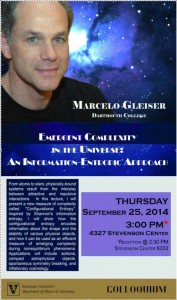Dr. Marcelo Gleiser on the Limits of Science and the Search for Meaning
The Chaplain’s Speaker series was excited to announce its fall 2014 speaker as Dr. Marcelo Gleiser from Dartmouth College. Dr. Gleiser will joined us on Thursday, September 25th at 7pm in Benton Chapel to discuss his latest work, The Island of Knowledge: The Limits of Science and the Search for Meaning. Speaking to over 130 students, staff, faculty, and community members, Dr. Gleiser worked through a very complex theory, but made it accessible to everyone. Describing the limits of science and knowlege, Dr. Gleiser showed how far we have been able to come with science and technology, but then also how this has its limits.
Humans have worked to understand and explain the universe for millennia, but Gleiser says we’ll never know it all—and proceeds to explain why. We are driven “to make sense of the world” and our place in it, and advances in mathematics and technology, from geometry and lenses to calculus and computers, have expanded our reach, revealing details of the very small and the very large. But as that “island of knowledge” grows, Gleiser says, “so do the shores of our ignorance.” From Copernicus’s proof that the Earth orbited the Sun to Isaac Newton’s laws of gravitation and motion, and quantum theory’s uncertainty principle, solutions that solved major problems also made many uncomfortable because they revealed deeper mysteries, showing “the true vastness of space and time.” Gleiser covers a broad swath of subjects—from cognition and curved space to particle physics, superstring theory, and multiverses—with a thoughtful, accessible style that balances philosophy with hard science. His island imagery will capture readers’ imagination as it examines the ideas that unnerve us even as they illuminate our world.
Gleiser was also a part of a colloquium address in the Department of Physics and Astronomy on Thursday, September 25, at 3:00PM in Stevenson 4327 entitled “Emergent Complexity in the Universe: An Information-Entropic Approach.” The abstract for his colloquium address was as follows:
From atoms to stars, physically-bound systems result from the interplay between attractive and repulsive interactions. In this lecture, I will present a new measure of complexity called “Configurational Entropy”. Inspired by Shannon’s information entropy, I will show how the configurational entropy encodes information about the shape and the stability of various physical objects, and how it can be used as an efficient measure of emerging complexity during nonequilibrium phenomena. Applications will include solitons, compact astrophysical objects, spontaneous symmetry breaking, and inflationary cosmology.

